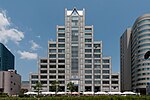Toy's Factory
1990 establishments in JapanAsian record label stubsJapan music stubsJapanese company stubsJapanese record labels ... and 4 more
Mass media companies based in TokyoRecord labels established in 1990ShibuyaUse mdy dates from April 2021
Toy's Factory Inc. (株式会社トイズファクトリー, Kabushiki gaisha Toizu Fakutori) is a Japanese record label founded in the late 1980s as a subsidiary of the entertainment company VAP, based in Japan. On May 30, 1990, it was established as an independent company. Toy's Factory, as of the first half of 2012, is the fourth-biggest Japanese record label.
Excerpt from the Wikipedia article Toy's Factory (License: CC BY-SA 3.0, Authors).Toy's Factory
Shibuya
Geographical coordinates (GPS) Address Nearby Places Show on map
Geographical coordinates (GPS)
| Latitude | Longitude |
|---|---|
| N 35.659722222222 ° | E 139.70527777778 ° |
Address
1
150-0002 Shibuya
Japan
Open on Google Maps







